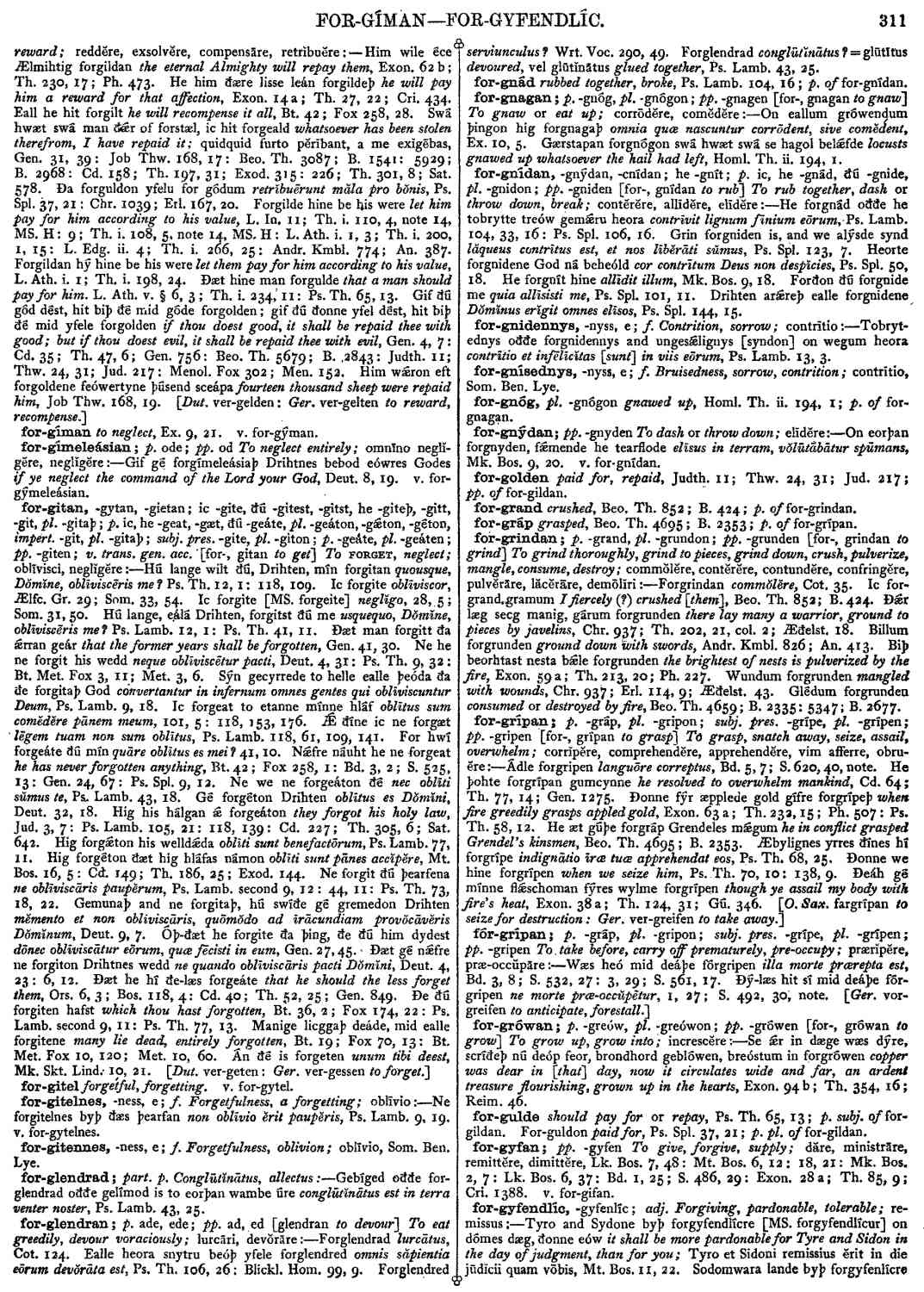for-gitan
- verb [ strong ]
-
Hú lange wilt ðú, Drihten, mín forgitan
quousque, Dŏmĭne, oblīviscēris me?
- Ps. Th. 12, 1: 118, 109.
-
Ic forgite
oblīviscor,
- Ælfc. Gr. 29 ;
- Som. 33, 54.
-
Ic forgite [MS. forgeite]
neglĭgo,
- 28, 5 ;
- Som. 31, 50.
-
Hú lange, eálá Drihten, forgitst ðú me
usquequo, Dŏmĭne, oblīviscēris me?
- Ps. Lamb. 12, 1: Ps. Th. 41, 11.
-
Ðæt man forgitt ða ǽrran geár
that the former years shall be forgotten,
- Gen. 41, 30.
-
Ne he ne forgit his wedd
neque oblīviscētur pacti,
- Deut. 4, 31: Ps. Th. 9, 32: Bt. Met. Fox 3, 11 ;
- Met. 3, 6.
-
Sýn gecyrrede to helle ealle þeóda ða ðe forgitaþ God
convertantur in infernum omnes gentes qui oblīviscuntur Deum,
- Ps. Lamb. 9, 18.
-
Ic forgeat to etanne mínne hláf
oblītus sum comĕdĕre pānem meum,
- 101, 5: 118, 153, 176.
-
Ǽ ðíne ic ne forgæt
lēgem tuam non sum oblītus.
- Ps. Lamb. 118, 61, 109, 141.
-
For hwí forgeáte ðú mín
quāre oblītus es mei?
- 41, 10.
-
Nǽfre náuht he ne forgeat
he has never forgotten anything,
- Bt. 42 ;
- Fox 258, 1: Bd. 3, 2 ;
- S. 525, 13: Gen. 24, 67: Ps. Spl. 9, 12.
-
Ne we ne forgeáton ðé
nec oblīti sūmus te,
- Ps. Lamb. 43, 18.
-
Gé forgéton Drihten
oblītus es Dŏmĭni,
- Deut. 32, 18.
-
Hig his hálgan ǽ forgeáton
they forgot his holy law,
- Jud. 3, 7: Ps. Lamb. 105, 21: 118, 139: Cd. 227 ;
- Th. 305, 6 ;
- Sat. 642.
-
Hig forgǽton his welldǽda
oblīti sunt benefactōrum,
- Ps. Lamb. 77, 11.
-
Hig forgéton ðæt hig hláfas námon
oblīti sunt pānes accĭpĕre,
- Mt. Bos. 16, 5: Cd. 149 ;
- Th. 186, 25 ;
- Exod. 144.
-
Ne forgit ðú þearfena
ne oblīviscāris paupĕrum,
- Ps. Lamb. second 9, 12: 44, 11: Ps. Th. 73, 18, 22.
-
Gemunaþ and ne forgitaþ, hú swíðe gé gremedon Drihten
mĕmento et non oblīviscāris, quōmŏdo ad īrācundiam provŏcāvĕris Dŏmĭnum,
- Deut. 9, 7.
-
Óþ-ðæt he forgite ða þing, ðe ðú him dydest
dōnec oblīviscātur eōrum, quæ fēcisti in eum,
- Gen. 27, 45.
-
Ðæt gé nǽfre ne forgiton Drihtnes wedd
ne quando oblīviscāris pacti Dŏmĭni,
- Deut. 4, 23: 6, 12.
-
Ðæt he hi ðe-læs forgeáte
that he should the less forget them,
- Ors. 6, 3 ;
- Bos. 118, 4: Cd. 40 ;
- Th. 52, 25 ;
- Gen. 849.
-
Ðe ðú forgiten hafst
which thou hast forgotten,
- Bt. 36, 2 ;
- Fox 174, 22: Ps. Lamb. second 9, 11: Ps. Th. 77, 13.
-
Manige licggaþ deáde, mid ealle forgitene
many lie dead, entirely forgotten,
- Bt. 19 ;
- Fox 70, 13: Bt. Met. Fox 10, 120 ;
- Met. 10, 60.
-
Án ðé is forgeten
unum tibi deest,
- Mk. Skt. Lind. 10, 21.
Bosworth, Joseph. “for-gitan.” In An Anglo-Saxon Dictionary Online, edited by Thomas Northcote Toller, Christ Sean, and Ondřej Tichy. Prague: Faculty of Arts, Charles University, 2014. https://bosworthtoller.com/11480.
Checked: 1